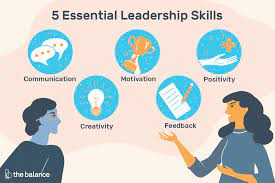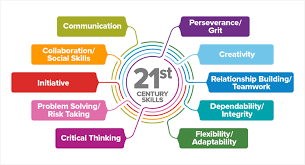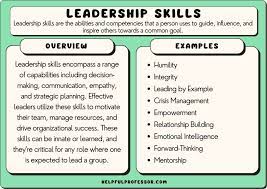The Key to Success: Effective Leadership Skills
Leadership is not just about holding a position of authority; it’s about inspiring and guiding others towards a common goal. Effective leadership skills are essential for fostering a positive work environment, driving productivity, and achieving success.
Communication
One of the most crucial skills for any leader is effective communication. Clear and open communication helps in setting expectations, providing feedback, and resolving conflicts. A good leader listens actively, speaks clearly, and ensures that everyone understands the vision and goals.
Decision-Making
Leaders often face tough decisions that can impact their team or organization. Strong leaders make informed decisions by gathering relevant information, considering different perspectives, and weighing the pros and cons. Decisiveness coupled with critical thinking is key to effective leadership.
Empathy
An empathetic leader shows understanding and compassion towards their team members. By recognizing others’ emotions and perspectives, a leader can build trust, foster collaboration, and create a supportive work environment. Empathy enhances team morale and loyalty.
Adaptability
In today’s fast-paced world, adaptability is crucial for effective leadership. Leaders who can adjust to changing circumstances, embrace innovation, and learn from failures are better equipped to lead their teams through challenges and uncertainties. Flexibility is a hallmark of successful leaders.
Inspiration
A great leader inspires others to reach their full potential. By setting a positive example, sharing a compelling vision, and motivating team members to excel, an inspirational leader can drive performance and foster personal growth within the team. Inspirational leaders create a culture of excellence.
Conclusion
In conclusion, effective leadership skills are vital for driving organizational success and creating a positive impact on individuals. By honing communication abilities, decision-making prowess, empathy levels, adaptability traits, and inspirational qualities, leaders can guide their teams towards achieving common goals while fostering growth and development.
5 Key Benefits of Effective Leadership Skills: Enhancing Performance, Trust, Communication, Decision-Making, and Workplace Morale
- Effective leadership skills improve team performance and productivity.
- Strong leaders inspire trust and loyalty among team members.
- Leaders with good communication skills can prevent misunderstandings and conflicts.
- Effective decision-making by leaders leads to better outcomes for the organization.
- Empathetic leaders create a positive work environment that boosts morale and motivation.
Six Detrimental Leadership Traits: Overconfidence, Micromanagement, Inflexibility, Burnout, Risk Aversion, and Delegation Deficiency
Effective leadership skills improve team performance and productivity.
Effective leadership skills play a crucial role in enhancing team performance and productivity. A skilled leader can motivate team members, set clear goals, provide guidance, and foster collaboration, resulting in a more efficient and harmonious working environment. By leveraging their leadership abilities to inspire and empower their team, leaders can drive productivity levels higher, leading to improved outcomes and overall success for the organization.
Strong leaders inspire trust and loyalty among team members.
Strong leaders inspire trust and loyalty among team members by demonstrating integrity, transparency, and consistency in their actions and decisions. When team members feel confident in their leader’s abilities and character, they are more likely to collaborate effectively, communicate openly, and strive towards common goals with dedication and enthusiasm. Trust is the foundation of a strong team dynamic, fostering a sense of security and mutual respect that enhances productivity and morale. Loyalty naturally follows when team members feel valued, supported, and empowered by a leader they trust. Effective leadership skills play a pivotal role in building strong relationships based on trust and loyalty within a team.
Leaders with good communication skills can prevent misunderstandings and conflicts.
Leaders with strong communication skills play a crucial role in preventing misunderstandings and conflicts within a team or organization. By effectively conveying information, actively listening to others, and ensuring clarity in messages, these leaders create an environment where expectations are clear, feedback is constructive, and issues are addressed promptly. Clear communication fosters transparency, trust, and collaboration among team members, reducing the likelihood of misunderstandings that can escalate into conflicts. Effective leaders act as bridges between different perspectives, ensuring that everyone is on the same page and working towards a common goal harmoniously.
Effective decision-making by leaders leads to better outcomes for the organization.
Effective decision-making by leaders plays a pivotal role in driving positive outcomes for the organization. When leaders possess the ability to make well-informed decisions, considering various factors and potential implications, they steer the company towards success. Strategic and timely decisions can lead to increased efficiency, improved productivity, enhanced innovation, and ultimately, sustainable growth. By demonstrating strong decision-making skills, leaders not only navigate challenges effectively but also capitalize on opportunities that propel the organization forward.
Empathetic leaders create a positive work environment that boosts morale and motivation.
Empathetic leaders play a crucial role in cultivating a positive work environment that elevates morale and motivation among team members. By demonstrating understanding, compassion, and genuine care for their employees, empathetic leaders build trust and foster strong relationships within the workplace. This sense of connection and support not only boosts morale but also inspires team members to perform at their best, feel valued, and remain motivated to achieve common goals. The empathy shown by leaders creates a culture of positivity, collaboration, and mutual respect, ultimately leading to increased productivity and overall job satisfaction among employees.
Overconfidence
Overconfidence can be a significant con of effective leadership skills as it may cause leaders to develop a sense of invincibility and superiority. When leaders become overly confident in their abilities, they may start dismissing valuable input from team members and fail to consider alternative perspectives. This arrogance can create a toxic work environment where communication breaks down, creativity is stifled, and team morale suffers. Overconfident leaders may also take unnecessary risks without fully assessing the potential consequences, leading to poor decision-making and detrimental outcomes for the organization. It is essential for leaders to balance confidence with humility to maintain effectiveness and foster a collaborative and inclusive workplace culture.
Micromanagement
Micromanagement can be a significant drawback of effective leadership skills. While it’s important for leaders to be involved and provide guidance, excessive micromanaging can stifle team autonomy and creativity. When leaders feel the need to control every detail and constantly oversee tasks, it not only hampers the team’s ability to make independent decisions but also undermines their confidence and creativity. Micromanagement can lead to a lack of trust between the leader and team members, resulting in decreased morale, productivity, and overall performance. Effective leaders should strive to strike a balance between providing support and direction without impeding their team’s ability to innovate and problem-solve on their own.
Resistance to change
One significant challenge that effective leaders may encounter is resistance to change. Despite their proven track record of success, these leaders may find it difficult to embrace new ideas or approaches because they have relied on established methods that have worked well in the past. This resistance can stem from a fear of failure, a reluctance to step out of their comfort zone, or a belief that the current way of doing things is still effective. However, in today’s rapidly evolving business landscape, being open to change and innovation is essential for staying competitive and driving growth. Leaders must recognize the importance of flexibility and adaptability in order to navigate shifting dynamics and lead their teams towards continued success.
Burnout
The pressure of upholding high standards of leadership can inadvertently result in burnout and exhaustion for even the most effective leaders. Constantly striving to meet expectations, make tough decisions, and inspire others can take a toll on a leader’s mental and emotional well-being. Burnout can manifest as feelings of overwhelming stress, fatigue, cynicism, and a sense of inefficacy in one’s role. It is essential for leaders to prioritize self-care, set boundaries, delegate tasks effectively, and seek support to prevent burnout and sustain long-term effectiveness in their leadership roles.
Risk aversion
One significant con of effective leadership skills is the tendency towards risk aversion. While strong leadership skills often emphasize careful decision-making and risk assessment, leaders can become overly cautious, leading to missed opportunities for growth and innovation. By being too risk-averse, leaders may shy away from taking calculated risks that could lead to significant benefits for their team or organization. This reluctance to step out of their comfort zone can hinder progress and limit the potential for achieving greater success in a rapidly changing business environment.
Lack of delegation
One significant con of effective leadership skills is the lack of delegation. While being highly competent and dedicated, effective leaders may struggle to delegate tasks as they often feel a strong sense of responsibility for every aspect of a project. This reluctance to distribute tasks can result in leaders becoming overwhelmed, stretched too thin, and unable to focus on strategic decision-making or high-priority responsibilities. Failure to delegate can hinder team development, limit efficiency, and impede overall project success as it prevents team members from taking ownership of their roles and developing their own skills.




